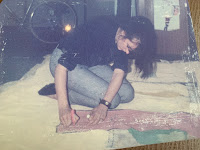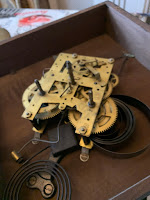Part 3: Developing, progressing, evolving......
 |
| me in the workshop |
Starting my new role in a brand new facility was such a privilege. The unit was still in development and it was a month before our first patient was admitted. I imagine we were an overwhelming sight when he entered the ward - so many nurses, me, a physio etc all eager to work with our first patient!
Anyway, first things first, training for working in a secure unit. How lucky were we to have the founder of Ethical Control & Restraint on our doorstep. Tom Starling, at that time a prison officer at Blundeston Prison had developed Control & Restraint based on the principles and techniques of Ju-Jitsu. He was/is such a character and drove around in a reliant robin car.
 |
| http://www.eccruk.com/about/ |
His techniques are practiced by thousands today both in prison services and in the health services. We learned breakaway techniques and how to control & restrain someone in a safe way and how to disarm someone with a weapon. I will say however that I never had to use these techniques at any time during my clinical practice.
A few were chosen to be trained as instructors, initially to train new staff but then it expanded to Regional services and also work with the police. I was one of these instructors - and have had some fascinating experiences - one particular event sticks out when we were helping police in their hostage training. I got to be both hostage and terrorist and fired some sort of machine gun (safely of course) and abseil down the side of a building. Possibly not much to do with occupational therapy - but character building non-the-less.
Life at the unit was all consuming and , as so many close knit environments, the team became close both work, rest and play - not always conducive to harmonious relationships - but overall we were learning and developing together, understanding each other's roles and how we could best work together. In fact, I think almost to the very day I left the consultant (who only ever called me Miss Hook) insisted on asking in ward rounds if we had been playing bingo with the patients!. I think he delighted in winding me up!
If all else failed we could meet up in the local pub - which I will admit became a bit of a second home - especially as I had moved in to one of the shared hospital houses near the unit - handy for work - but also on occasion for covering late shifts if staffing was short - or snow prevented staff getting in. There were many occasions I was there for over 12 hours a day - but it didn't feel like work.
I loved my workshop - I worked with the _best_ technical instructor and together we developed a range of activities that enabled the patients to engage in things that allowed them to develop skills - social skills, communication, practical skills, skills for independence etc. Each ward had a kitchen where we worked on menu planning and cooking - and when parole allowed to go to local supermarkets etc. We made links with local employers to help place patients who were transitioning towards discharge for future potential employment. We developed an allotment, a car maintenance workshop, woodwork area, typing and computer skills (in the _very_ early days of the computer!), and areas for leisure including art and pottery areas.
That first year, we even wrote, produced and delivered our own pantomime. All staff and patients were involved in either the acting or the back stage work. The stage, backdrops and props were made in the workshop, the costumes were borrowed (some from the Theatre Royal in Norwich - which is where I was carrying so many things I fell over Wayne Sleep - I didn't see him!). I wrote the script with 2 others based on 7 years after the "happily ever after" of Snow White. It gave the unit such a focus for quite a few months as we prepared to put on the performance to local dignitaries (good PR) friends and family of staff and patients. I was even interviewed on local radio and the localpress on the benefits of the occupations involved and what the patients were learning and developing from their involvement.
The night of the performance (and yes - that invite was printed on an Adana Printing press!) we had taken over the only occupied ward at that time for costume and makeup and the workshop too. Then an emergency admission came in - imagine being admitted onto a ward where the Nursing Officer on duty was dressed as one of the seven dwarfs, the Charge Nurse was an Ugly Sister and wandering around were others in strange costume. I hope the new patient wasn't experiencing psychosis!!! Anyway, the panto was a huge success.
In later years our team expanded and we became part of the basic grade rotation scheme, having a number of great basic grades pass through the doors and another technical instructor who was great with the patients and took on most of the kitchen activities. By this time I had finally passed my driving test (hated lessons - never a good student at anything) and took my ambulance driver test so that I could drive the mini-bus.
So many memories are tied up with this part of my career. It was the time of Band Aid and Live Aid and Sports Aid (we did a bed push down the main road towards the city).
We had sponsored walks to raise money for a minibus, another pantomime in 1988. In fact many things were done to raise money....
I took a diploma in accounting and another in supervisory management. We played practical jokes on each other, we laughed, we argued, we took risks, I grew up personally and professionally.
I was at the unit for about 8 years all in all - I did move roles for a year to take on a Head I role with responsibility for all the mental health occupational therapy services across the whole of the Norfolk region (including 6 hospitals, out patient and day hospitals, art therapy and child psychiatry). I will say that it was interesting - but it wasn't for me - I'm best as a second in command. They were unable to replace me in my forensic role so after a year I asked to go back. However, I was only to return for one more year before moving north to take on the Head role there for adult and older adults mental health services (in patient, day hospitals and art therapy) as they prepared to move out into the community teams being set up.
I have very fond memories of my time in the unit. The opportunity to work with some great people, hone my professional identity and make some great friends into the bargain is one I shall always cherish.
The Science Bit:
(I can't totally vouch for the exact timeline - but it's Ok for the purposes of illustration)
As we moved into the mid to late 1980s the profession started to develop further first bringing in Diploma 88 and then a new Degree programme to replace the Diploma in the early 1990s. The Community Care Act of 1990 also started to move many more patients and interventions into the community. During this time, many workshops and occupational therapy departments were starting to be dismantled and a move away from the more traditional "doing" interventions and more towards self care, discharge planning and adaptations approach followed.
Around the same time, occupational science was establishing itself as the science of studying the things people do in their everyday lives and how those occupations influence and are influenced by health and well-being.
Occupational Therapy took a while to embrace much of this new science but as the degree programme started , models of practice were developed giving more emphasis to research and evidence based practice and a move back to reclaiming occupation as an intervention was kick started in the 1990s possibly as the first graduates started working.
But I get ahead of myself! What I wanted to contextualise is that I followed very much the "doing" approach and valued the results achieved within the patient population we were engaging. Much of this new theory was bypassing me and it was only when I moved jobs in 1991 to take on a Head post in the North of England that I began to be exposed to working with other occupational therapists who had trained in these areas and held a degree in occupational therapy. More of that in the next post. January 1991 I leave Norwich, I leave Norfolk and start a new adventure elsewhere.
To Be Continued...........
Part 1:Validation, the Early Years
https://ichabodsday.blogspot.com/2020/09/validationthe-early-years.html
Part 2: Of First days, Roles and Responsibilities
https://ichabodsday.blogspot.com/2020/09/of-first-days-first-roles-and.html
Part 3: Developing, Progressing, Evolving
https://ichabodsday.blogspot.com/2020/09/part-3-developing-progressing-evolving.html
Part 4: Of Culture Shocks, Mentors and A Professional Language
https://ichabodsday.blogspot.com/2020/09/part-4-of-culture-shocks-mentors-and.html
Part 5: Technology, Publications and Collaborations
https://ichabodsday.blogspot.com/2020/09/this-next-period-spans-20-years-so-i.html
Part 6: Of National and International Involvement, Swansongs and Goodbyes
https://ichabodsday.blogspot.com/2020/09/post-6-of-national-and-international.html







Comments